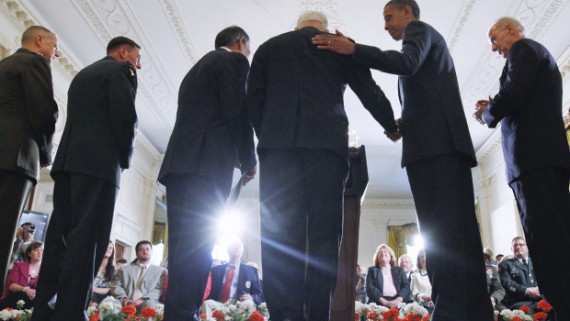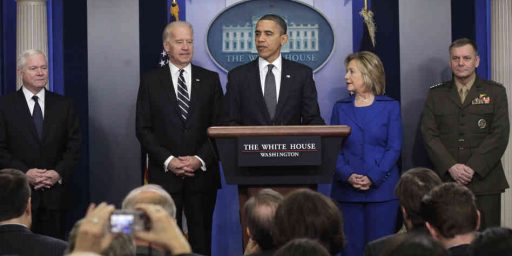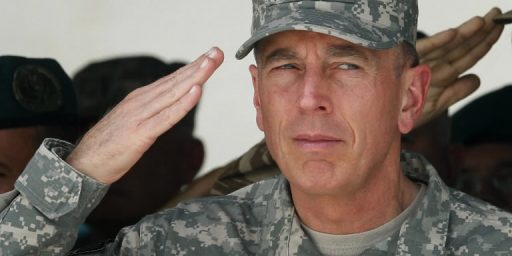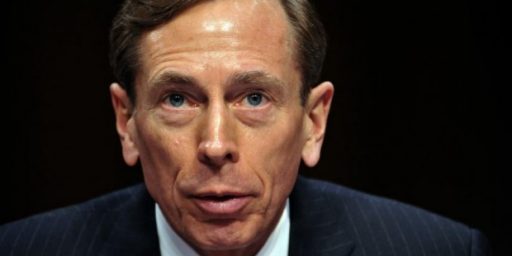Afghan Surge Ending
President Obama is expected to announce the withdrawal of the 30,000 Surge troops.
When he announced the Afghan Surge, President Obama promised a “significant” withdrawal starting in July 2011. Now, he’s expected to announce the withdrawal of a mere 30,000 troops by the end of 2012, CNN reports. Thus, he’ll barely reverse the surge itself and do so much later than his announced deadline.
The announcement will be in a speech tomorrow.
President Barack Obama will give a speech on the Afghanistan troop drawdown on Wednesday, a senior administration official said Monday.
The news came hours after White House Press Secretary Jay Carney told reporters that Obama had yet to make a final decision on the size and scope of the troop withdrawal, but would do so “soon.”
“The president is still in a process of finalizing his decision on the pace and scope of the drawdown that will begin in July of 2011,” Carney said Monday afternoon. “He’s finalizing his decision. He’s reviewing the options and the assessments and will have an announcement to make soon.”
An estimated 100,000 U.S. troops are serving in Afghanistan, some 30,000 of which are part of the so-called surge ordered in late 2009 in a bid to control the rising violence.
Obama has said those troops would begin coming home in July, and he recently indicated the number would be “significant.”
It was not clear then what the president considered significant. White House officials have not elaborated.
The president has repeatedly said he is confident the United States can meet the self-imposed deadline to begin bringing U.S. troops back from Afghanistan without compromising Afghan security, though military commanders and government officials have raised concern about the readiness of Afghan security forces.
It’s been clear almost from the moment of the announcement that there was no exit strategy. Both Defense Secretary Robert Gates and then-Central Command and later ISAF chief David Petraeus constantly minimized the significance of the July deadline. And the US agreed with the other NATO Allies to remain in Afghanistan in an active combat role through at least the end of 2014.
A CBS report notes that the speech coincides with a “a changing of the guard in Washington and Kabul.”
Defense Secretary Robert Gates, who has presided over the Afghanistan and Iraq wars for four and a half years, is retiring next week. The top two American generals in Kabul — David Petraeus and David Rodriguez — are due to leave for new assignments as early as July – Petraeus as head of the Central Intelligence Agency (if confirmed by the Senate), and Rodriguez as Commanding General of the U.S. Army Forces Command. Also departing in July is the U.S. ambassador in Kabul, retired Army Lt. Gen. Karl Eikenberry, who in 2006-07 served as the top commander of U.S. forces in Afghanistan.
Their replacements will no doubt bring fresh eyes to Afghan war policy as the White House looks to wind down 10 years of conflict in the country.
Gates said during a visit to Afghanistan earlier this month that it’s too soon to adjust strategy, even taking into account the impact of the May 2 killing of al Qaeda leader Osama bin Laden in Pakistan. Gates also has cautioned against a rapid drawdown of U.S. forces. He has argued that more time is needed to pound the Taliban to the point where its leaders will feel compelled to engage in serious peace talks. On the other hand, the administration knows the U.S. public is weary of war — its human and financial costs. So spelling out a significant withdrawal plan could provide Obama with a political boost heading into the 2012 elections.
Gates, Petraeus and Navy Adm. Mike Mullen – the Joint Chiefs chairman who will retire Oct. 1 – have been among the administration’s strongest advocates of a troop-intensive approach to the war.
Leon Panetta, the CIA director who is expected to win Senate confirmation Tuesday to succeed Gates as Pentagon chief on July 1, has not been expansive in public about his views on Afghanistan.
Stephen Biddle, a defense analyst at the Council on Foreign Relations, told the Associated Press their departure could create a shift in the balance of war advice within the administration. “You’re replacing people that had a very distinct perspective and were very effective proponents of that view,” Biddle said in a telephone interview Monday. It’s unlikely, he said, that the incoming team — headed by Panetta — will be as unified in its views or as effective in promoting them. You might reasonably expect that the (troop) drawdown will be faster and deeper than it would have been” if Gates and the others had stayed on, Biddle said.
While the Surge may be ending, there’s no evidence of a broader shift. Despite public opinion having turned against the war in the US–which had long since happened in Europe–the prospect of leaving Hamid Karzai to fend for himself against the Taliban is sufficiently dismal as to make pulling up stakes a non-option. NATO will likely keep muddling through until the end of 2014–and perhaps beyond.







There is no exit plan – of the type that would specify dates by which troop levels would be reduced, up to and including getting the levels to zero. But surely there is an exit strategy – a vision of the conditions under which we would leave, and a focused effort at bringing those conditions about. Namely – building up the government’s forces sufficiently, and degrading the Taliban’s forces sufficiently such that the latter sues for peace, and the former are able to extend and solidify their control of the country. Why do you not consider that a strategy (whether it has good chances for success being a separate question…)?
Quick – name a military action in your lifetime that had an exit strategy. Exactly.
@Tano: The goals are too amorphous to constitute a strategy in my view.
@hey norm: Desert Storm had very finite goals, which were achieved and led to the war’s end. Ditto Grenada (Urgent Fury), Panama (Just Cause), Haiti (Uphold Democracy), Libya (El Dorado Canyon), and many others.
I stand corrected.
I would only offer that Obama inherited a theater of operations without an exit strategy that had been largely ignored for 7-odd years. Withdrawing 30% of the troops is withdrawing 30% of the troops whether that was the size of the escalation – yes escalation, not surge – or not. As a practical matter you gotta withdraw the first 30% before you can withdraw the other 70%.
Trust me…I am not a big fan of how Afghanistan has been run by Obama. But had it been run right in the first place we wouldn’t be having this discussion.
Bottom line: “…Never get involved in a land war in Asia…”
Declare victory and pull out is always available as an exit strategy if we can’t come up with a better one…but we’re already using that for Iraq.
Historically, the only exit plan that has succeeded is unconditional surrender. Tough to put that on a timer.
Charles is correct, in that unconditional surrender is really the only exit strategy that works.
Trouble is, total victory depends on being able to hold and control territory, which in turn requires the will and ability to keep in place an occupying army, for as long as it takes.
Looking at Northern Ireland, Vietnam, or any other place where a determined insurgency defends itself from an invading foreign occupier, I would say it will take a generation or two to pacify and subdue the Afghan people.
I doubt the American people are up for that kind of committment.
@Charles:
Unfortunately, “unconditional surrender” only works in terms of armies/states under centralized control. The problem of the “new war” (or/and the very “old war”) is that your enemy is essentially franchised – the Taliban is as much a floating “brand” that can be taken up by multiple groups. Likewise, the other problem is that there’s the overlap in this war, meaning that we are not just at war with the Taliban, but also the proxy groups (and potentially Governments) that are working with them.
“Successful Exit Strategies” as your discussing are impossible in a war like this.
@James- Only Desert Storm is really an appropriate analogy. By your standards, Desert Fox also counts.
To the larger issue, the Taliban is not a unified single organization. I dont really think that you can pound them enough to make them want to negotiate. They have Pakistan for retreat when they want. They dont seem to have much trouble getting recruits. I think that we can make a reasonable attempt to prepare the Afghan military, ten years is a good effort, then we have to leave it to them to decide what kind of country they want. Pakistan and India will interfere anyway.
Steve
which I think summarizes the situation pretty well. The viable alternatives were permanent occupation (for which there never has been political support) and punitive raid only. We elected wishful thinking.
What astonishes me in all of the discussion, James, is how strategy-free the entire discussion is. Afghanistan has not had, does not have, and will not for the foreseeable future have an economic infrastructure sufficient to support the kind of standing army that would be necessary to preserve its own security (at least not if you define “preserve its own security” as survive Taliban reassertion of control over all or part of the country following U. S. departure).
As I see it the dilemma we face is how to keep funding an Afghan military after we depart, in the face of an obviously corrupt regime, with no end in sight, and to do it with bipartisan support.
@steve and @Dave Schuler:
Yes, the muddling through without a serious strategy predates Obama. But Obama doubled down on it and turned what was a mostly peaceful meander into a killing zone.
OEF Deaths By Year:
Year US UK Other Total
2001 12 0 0 12
2002 49 3 18 70
2003 48 0 10 58
2004 52 1 7 60
2005 99 1 31 131
2006 98 39 54 191
2007 117 42 73 232
2008 155 51 89 295
2009 317 108 96 521
2010 499 103 109 711
2011 184 26 47 257
Total 1630 374 534 2538
You don’t have to persuade me, James. I thought the “Afghanistan Surge” was foolish.
steve:
What is the U. S. strategic interest that would be served by an additional 10 years in Afghanistan? What will have changed by then?
Dave:
I was referring to the ten years we have already been there. IIRC, we started training programs pretty soon after we invaded. I’m thinking that if we do not have a sizable core of functional Afghan military by now, that the problem is more on the Afghan side than on ours. As James points out, if we intend to train the 300,000 plus that some want, how does that get paid for and for whom will they really work? If the Afghan people value a military, they will make one and pay for it.
Steve
Nonsense.
Troop deaths in Afghanistan have been growing at a steady rate since 2003.
what was a mostly peaceful meander
Wow. That’s some Rumsfeld-level bullshit there, James.
yeah exactly…”peaceful meander”…wtf?
I think you misunderstand the situation in Afghanistan. The Afghan economy is incapable of supporting a modern standing military of the size needed. It’s not a question of whether they value it or not; it’s a question of whether we value it or not.
That was the situation in 2000, it’s the situation now, and it’s likely to be the situation for the foreseeable future. It’s not a surprise. That’s what was being purchased when we decided to occupy the country.
Yep,
America is spending five time Afghanistan’s entire GDP each year on…whatever it is we’re doing there.
BTW, to place the table that James included in his comment into some perspective the number of soldier killed in OEF in 2002 through 2004 wasn’t completely out of line from what might be expected with a force of that size regardless of where they were. So, for example, according to DoD statistics in a force the size of the one we currently have in Afghanistan we should expect roughly 100 deaths per year.
Clearly, circumstances changed from 2005 forward. We could argue over what that was. I think it’s a function of the number of troops in-country and pace of operations. IMO doubling down was a mistake but, then, I think invading the country in 2001 was a mistake.
The mistake was declaring war on the Taliban when they offered to hand bin Laden and al Qaeda over to us shortly after 9/11.
We can argue about Afghanistan until we are all blue in the face. Bottom line is we have accomplished all we are going to accomplish there (whatever that is). Time to leave.
The mistake was declaring war on the Taliban when they offered to hand bin Laden and al Qaeda over to us shortly after 9/11.
I don’t actually remember that happening.
“I think you misunderstand the situation in Afghanistan. The Afghan economy is incapable of supporting a modern standing military of the size needed. It’s not a question of whether they value it or not”
I think you misunderstand paying for an army. If they were willing to pay for a military, that also implies that they are willing to support it. If the Taliban are unable to hide among the people, there numbers are small enough that a smallish force, augmented by tribal militias, should be ok. This all hinges upon what they value. If they do not think a military will help, if they would rather cede power to the Taliban, they wont pay for an army. IOW, fighting insurgencies with foreign troops takes a lot more of them, or, fighting an insurgency with unpopular native troops takes a lot more.
Steve
Not many people do
http://www.independent.co.uk/news/world/asia/bush-rejects-taliban-offer-to-surrender-bin-laden-631436.html
From the article Ponce linked:
“Mr Kabir said: “If America were to step back from the current policy, then we could negotiate.” Mr bin Laden could be handed over to a third country for trial, he said. “We could discuss which third country.”
But as American warplanes entered the second week of the bombing campaign, Washington rejected the Taliban offer out of hand. “When I said no negotiations I meant no negotiations,” Mr Bush said. “We know he’s guilty. Turn him over. There’s no need to discuss innocence or guilt.”
Hmm, I do vaguely remember that. Of course, it could have been a ploy to buy some time to “negotiate” and get binny out of the country to Pakistan. Or it could have been sincere. I also suspect there was a desire to punish the Taliban for harboring OBL in the first place, by throwing them out of power.
That’s long gone now. The question is what do we do now. And the answer, I think, is to leave. I think Obama’s decision to double-down was a mistake, and thought so at the time.